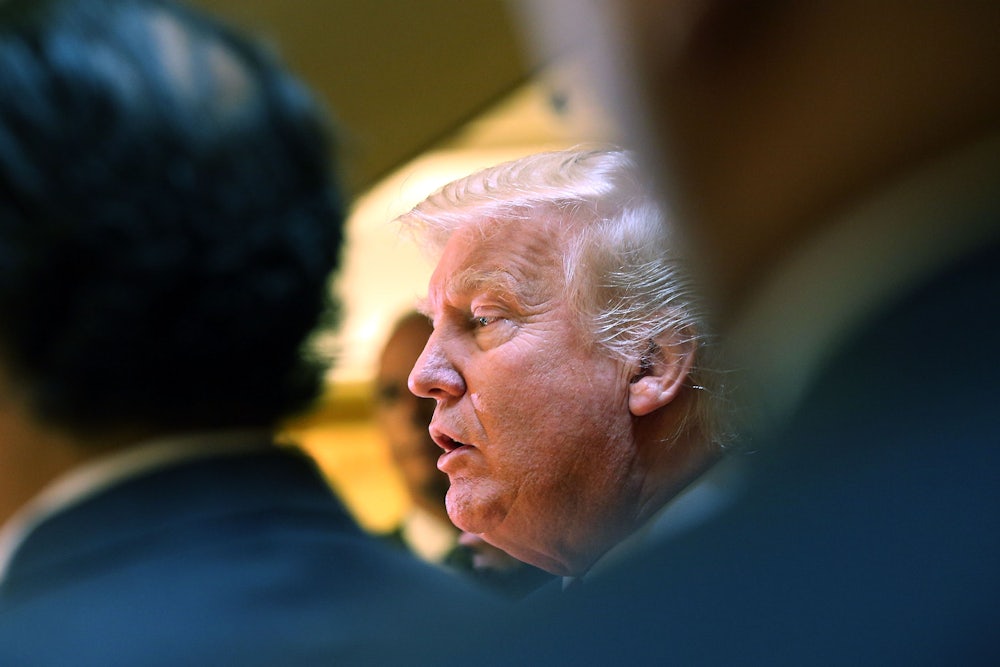Conservatives seeking to deny Donald Trump the Republican Party’s presidential nomination might fail, but it won’t be for lack of trying. These conservatives have attacked him from every conceivable angle, including with a variety of No True Scotsman-like claims meant to convince GOP primary voters that Trump is actually a pro-choice, single-payer-loving liberal in disguise.
In part because Trump is most popular among less-ideological Republican voters who don’t value philosophical purity, and in part because he is both affectively and positionally very conservative, with influential conservative celebrity backers, this genre of anti-Trump criticism has largely failed. At best, it may have succeeded in putting a not-terribly-low ceiling on his support.
But “Trump is liberal” is one of the only arguments conservatives can make that doesn’t implicate their movement in embarrassing ways or risk harming the party in the general election. One of the #NeverTrump crusade’s great ironies is that in trying to stop a candidate they perceive as an imposter, conservatives have embraced liberal assumptions and lines of attack that they would normally decry as baseless or risible.
It is perhaps revealing that in desperate times, conservatives will accept liberal assumptions about politics, culture, and media. But it is almost certainly the case that these are expedient, calculated positions, and that the same conservatives will re-embrace a more orthodox worldview as soon as the primary is over, no matter who wins.
In conventional conservative doctrine, the mainstream press and much of the new media are little more than arms of Democratic Party officialdom. Also, bigotry and misogyny are no longer widespread problems, in the right’s telling—and to the extent that they still exist, they are no more prevalent on the right than on the left.
In their efforts to stop Trump, conservatives have sidelined these and other premises about American political culture, so that the generic liberal critique of conservatism might be deployed against him and him alone.
Conservatives generally treat any media scrutiny of Republican politicians as inherently suspicious or invalid—subterfuge masquerading as impartial reporting or analysis. In 2012, when reporters discovered that Mitt Romney’s tax plan contained either an implicit middle-class tax increase or a false promise of deficit neutrality, Republicans rejected the reporting and underlying analysis as the work of conniving liberals with a rooting interest in Romney’s failure.
Today, conservatives are desperate for the media to apply its supposedly liberal, biased scrutiny to everything Donald Trump says and promises, despite the fact that hard analyses of Trump’s tax and health-care plans apply equally, and just as unflatteringly, to Ted Cruz and other leading Republicans.
So sick and tired of reporters who think tweeting snarky things about Trump is doing their jobs. Call him a liar. To his face.
— Patrick Ruffini (@PatrickRuffini) March 30, 2016
Whether Trump wins or loses the Republican nomination, it is a safe bet that conservatives will rescind their invitation to scrutinize or call out Republican politicians the moment a nominee has been selected. At that same moment, many conservatives will likely lose their newfound ability to detect racism or bigotry as animating forces in Republican politics. Conservatives have highlighted Trump’s misogyny in ads and other media:
But if and when the Republican campaign against Hillary Clinton descends into misogyny, you will hear these same conservatives dismiss accusations of sexism as unfounded liberal intimidation.
Republicans today also admit that the Trump campaign has fostered a “culture of violence,” although until Trump became an existential threat to movement conservatism, conservatives were largely contemptuous of the very idea that institutions might value and nurture violent behavior. No matter who wins the GOP nomination, conservatives will unlearn this lesson. If Trump becomes the GOP’s nominee, his acts of incitement will be forgiven.
This is why many conservatives contend Trump is conforming to a liberal caricature of conservatism that doesn’t actually resemble real-world conservatism: They want to avoid being caught in their contradictions later on. In addition to decrying Trump’s failings per se, they thus also fret publicly that he is making the GOP look bad.
But as Trump’s support among Republican voters has grown, the argument that Trumpism isn’t an organic outgrowth of GOP politics has become less and less tenable. “It would be terrible to think that the left was right about the right all these years,” The Wall Street Journal’s deputy editorial page editor, Bret Stephens, admitted a few weeks ago. “If Donald Trump becomes the candidate, he will not win the presidency, but he will help vindicate the left’s ugly indictment. It will be left to decent conservatives to pick up the pieces.”
It would be a staggering development if conservatives responded to Trump’s success by acceding to liberal critiques of the right in an enduring way. But as welcome as such a reckoning would be, it is at the very least unlikely to materialize quite as automatically as Stephens imagines. That will be especially true if Republicans manage to wrest the nomination from Trump—and can then so easily disclaim all the concessions they made during the primary, and return to business as usual in the general election.
